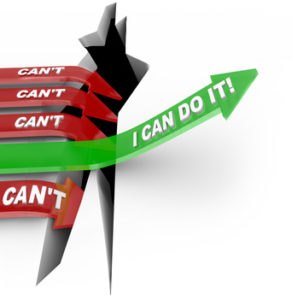 Do you know someone who can’t seem to go through difficulty without collapsing emotionally? Whether the difficulty is a natural disaster, a broken relationship, or a financial loss…
Do you know someone who can’t seem to go through difficulty without collapsing emotionally? Whether the difficulty is a natural disaster, a broken relationship, or a financial loss…
Some people can weather difficult storms with strength and resilience. Others become grief-stricken and shut down every time something disappointing happens. Why is that?
So what is resilience, anyway?
Resilience is the ability to absorb and then find a healthy way to adapt to what you’re faced with.
Attitude: Resilient or Victimized?
A key to understanding and developing resilience, is attitude. Or better said, perception. Those who look for ways to learn and grow in each difficulty presented to them, are the ones who are actively growing a bumper crop of resilience. It’s how you perceive the difficulty you face that makes the difference.
Do you meet challenges on your own terms, believing the outcome is based on who you are and how you respond?
Or…do you feel victimized by storms, fold up and lick your wounds when times are tough? Do you tend to see the glass half empty? If so, you may have a difficult time recovering from an adverse situation or experience.
Resilience Takes Practice
Anyone who goes through life with a proverbial halo over his head, never challenged, always rewarded, may or may not have the resilience he needs to draw from when times are tough. Until you face hardship or difficulty, you never know how you’ll respond to it.
On the other hand, we also know we can train ourselves to be less resilient. if you’ve had challenges every step of the way, you have the best opportunity for displaying resilience, or else learning how to develop it. Because it’s in the presence of the storm that resilience is developed.
Psychologists who conducted studies of children in extremely trying circumstances learned how they either succumbed to or surmounted their situation. Among the children, about 2/3 succumbed to their circumstances, losing their belief in themselves, and their hope for future achievements.
But about 1/3 responded to their dire circumstances with determination and a belief that they were in control, that their outcome would be the result of their own decisions and actions.
What they concluded is that the children who rose above their circumstances, who piloted their own journey through their personal storms, were those who did not view their difficulties as traumatic, but as just another difficulty to be overcome.
Trauma is How You Perceive It
Only those who view difficulty as traumatic are, in fact, traumatized.
What’s more, anyone can learn to view the difficulties they face in life in a resilient way. By learning to view an emotionally-charged experience as less emotional, and more factual, you can remove the traumatic association of it. Then, train your emotions to view it with less pain. By doing this, you can learn to regulate your emotions, and strengthen your resilience.
On the other hand, we also know we can train ourselves to be less resilient. By exaggerating the emotional feelings tied to an experience, by thinking about it, talking about it, meditating on it, we can convince ourselves we’ve been traumatized. And that traumatized orientation will continue to follow us through life unless we set about to change it. We don’t even realize we’re doing this to ourselves.
When you perceive a difficult situation as one that’s threatening, your own ability to face it and overcome it drains away. Conversely, view it as a challenge to be overcome, and your emotions remain strong and agile, adapting as you go and building inner strength along the way.
This is what those resilient children discovered on their own.
Some of them may have been fortunate to find a friend or relative who gave them support, as studies have shown that the most resilient of people are those who are closely connected to mentor or peer group support.
David Brooks’ work on resilience in children has shown that the one thing that is found is children who develop resilience is the presence of a charismatic adult in the life of that child.
Studies of military groups found those units with the strongest peer support and highest morale were the most adaptive in stress situations such as battle.
Flexibility

Flexibility is a core value for resilience. The ability to adapt to circumstances as you navigate through them, gives you the power to emerge successful.
In the award-winning movie, Pursuit of Happyness, Chris Gardner (played by Will Smith) faced ever-increasing obstacles and hardships that would have crushed many to despair, as he sought a better life for himself and his son. But his flexibility in the face of those hardships, and his stubborn tenacity in holding to his belief he would overcome them was the reason he did.
In one scene, he locked himself and his son in a public restroom to sleep in safety, then woke the next morning to continue his quest to get the career that would change his and his son’s destiny.
For some, that one experience alone would have been seen as traumatic. And hope would have drained away. But for Chris, it was a means to accomplish what he had to do to achieve what he wanted to achieve. It was a bump on the road to success.
Resilience is Learned
And, remember, you can learn to adapt, to change the way you see the challenges and stressors, every day. Take a moment to look at your circumstances. Are they as damaging as you tell yourself they are? Can you look at them with an objective view and see ways to adapt your attitude to move forward? If you can, you’re building your own crop of resilience, and paving the road to your own success. There’s no shame in realizing you have invited a traumatized view of an experience. We’ve all done it. The key is to change to become a happier person.
You really are the captain of your fate in this life, as you strengthen your skill to ride the ups and downs in life that surround you.
Look for ways to develop resilience in your own life daily. The opportunities are all around you. And if you don’t see where to start, you may benefit from our innovative approach and advanced psychiatric services, such as TMS or IV Ketamine treatment.
Contact us and let’s discuss your options. You really can feel better and live a rewarding life.
To the growth of your best self,
Lori Calabrese, MD
